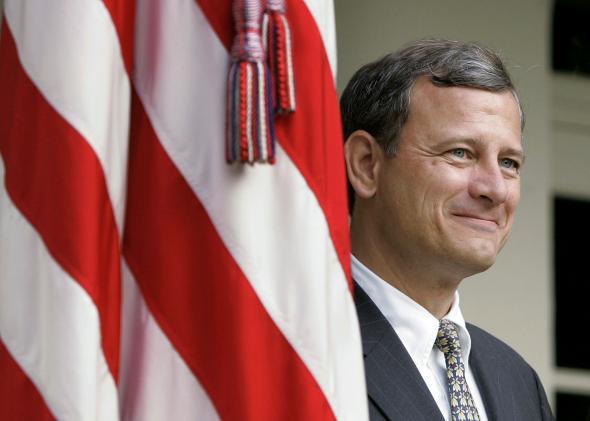Following the Supreme Court’s surprising refusal to review a group of major marriage equality cases on Monday, court-watchers quickly came to a general consensus: It’s over. Instantly, the court’s move brought gay marriage to five states. Within weeks, it’ll bring gay marriage to six more, including deep-red Kansas and South Carolina. If five members of the court wanted to halt the domino effect set off by United States v. Windsor, this was their last real chance.
The question, then, is no longer whether the Supreme Court will eventually rule in favor of marriage equality. The question is which justices will wind up on the winning side of the vote. Everybody knows the Windsor Five (Justice Anthony Kennedy plus the four moderate liberals) support gay rights, while the three arch-conservatives (Justices Antonin Scalia, Clarence Thomas, and Samuel Alito) oppose them. That leaves one vote—Chief Justice John Roberts. For years, court-watchers have whispered that he might be “get-able” on gay marriage. Now the issue is, once again, at the court’s doorstep. Is there any reason to think Roberts will swing to the left this time around?
A quick glance at the evidence creates cause for skepticism. Roberts, after all, dissented in Windsor and even attempted to undermine the majority opinion by insisting that it didn’t affect states’ ability to ban gay marriage. (How did that work out, Mr. Chief Justice?) But Robert’s three-page Windsor dissent—which was joined by no other justice—is actually a carefully crafted and opaque piece of work. Roberts wrote that the Defense of Marriage Act is constitutional not because all anti-gay laws are presumptively constitutional, as Scalia insisted, but because it furthered “uniformity and stability” in federal marriage laws. Then Roberts noted that “without some more convincing evidence that the Act’s principal purpose was to codify malice, and that it furthered no legitimate government interests,” he would have to vote to uphold the law.
This widely overlooked passage is actually extremely important. It’s essentially a hedge: Roberts consider this anti-gay law to be constitutional, since Congress—forced to contend with the marriage laws of 50 different states—requires a single definition of “marriage.” But if an anti-gay law were passed that more obviously “codif[ied] malice,” Roberts hints, he might suggest striking it down. (“Malice,” by the way, sounds an awful lot like “animus,” the court’s current constitutional test for anti-gay laws.) In his own fiery dissent, Scalia mocked the notion that openly malicious anti-gay laws are unconstitutional, refusing to accept the Windsor majority’s basic premise. Alito, also writing separately, bluntly dismissed gay marriage as “not a difficult question of constitutional law.” Roberts declined to join those portions of either opinion.
Why would Roberts refrain from adopting his conservative colleagues’ hard line against gay marriage? It’s entirely possible that he was quietly carving out room to grow. DOMA, Roberts held, was not designed to “codify malice” and so it was constitutional. But what about a state-level ban with an undisputable track record of raw animosity? Many of these bans were passed by referendum, leading anti-gay groups to sponsor astonishingly vicious ads slandering gays as perverts and pedophiles. Some bans were passed by state legislators, who often spoke of gays as immoral aberrations who deserve to be disadvantaged by the law. Surveying this irrefutable history of hatred, Roberts could vote to strike down state bans for exhibiting unconstitutional “malice”—without reversing his position in Windsor.
If the breadth of a ruling that outlaws gay marriage bans in all 50 states still gives Roberts pause, he has another option. Say the court ultimately decides to review Texas’ gay marriage ban, and the Windsor Five use the case to secure marriage equality nationwide. Roberts could write an opinion “concurring in the judgment only”—that is, agreeing that Texas’ gay marriage ban is unconstitutional, without holding that every gay marriage ban must also fall. Sure, Roberts could write, Texas exhibited unconstitutional “malice” in passing its gay marriage ban. But that doesn’t mean other states shouldn’t have an opportunity to argue for their bans’ constitutionality in court.
Roberts has used this maneuver before. In a landmark case called Graham v. Florida, Kennedy and the liberals held that minors may never be sentenced to life in prison for non-homicidal crimes. Roberts concurred in the judgment, writing separately to explain that while the minor in this case could not be sentenced to life in prison, juries should be permitted to impose life in prison for other minors who commit non-homicidal crimes. It was a nuanced argument, and a largely ignored one: The press described the ruling as 6-3, while some liberals praised the chief justice’s reasonableness. Roberts got the credit without surrendering his conservative credentials.
What does good press matter to an unelected judge with life tenure? That’s easy: No matter how independent-minded Roberts may want to be, the chief justice clearly casts every vote with an eye toward his legacy. In his heart, Roberts surely knows that a vote against marriage equality will stand out as an eternal smear on his record—a smear he has every reason to avoid. Roberts has a lesbian cousin. He did pro bono work on the first successful gay rights case in Supreme Court history. The man is not a homophobe, and he has no incentive to be remembered as one. Everyone, including John Roberts, can already count five votes for marriage equality. With so little to lose and so much to gain, why not swing over to the right side of history?
